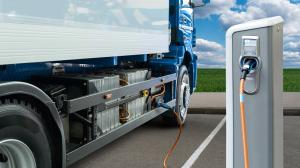
The need to decarbonize the transport sector is driving the rapid expansion of electric cars, which totaled 10 million sales worldwide in 2022 (for a market share of 14% of total sales) up from just around 1 million in 2017.
Electrification is also extending to heavy-duty vehicles, such as buses, coaches and trucks above 3.5 tons, albeit at a much lower speed given their size, weight and specificities. One key difference with light-duty vehicles is that for several truck categories, a significant share of the energy stored in the vehicle is used for purposes other than propulsion. For example, for cooling in the case of refrigerated trucks for the transport of food or certain medical supplies; concrete mixers, where most of the energy is used to mix concrete. In 2022, only 1.2% of the 60,000 heavy-duty vehicles sold worldwide were electric.
In March 2022, UNECE’s World Forum for Harmonization of Vehicle Regulations (WP.29) adopted a UN Global Technical Regulation No. 22 providing minimum performance requirements for the battery durability of electrified light-duty vehicles. The European Union and the United States have already made legislative proposals to transpose this regulation into their legislations.
The World Forum has now decided to develop similar provisions for heavy-duty vehicles under a new UN Global Technical Regulation. An internationally harmonized procedure to assess battery durability will facilitate comparisons between different models and manufacturers. Given that batteries are the single biggest driver of cost for electric vehicles, it will thus provide buyers with a key element to compare offers and direct their investments.
A draft proposal of the new technical regulation is to be finalized by mid-2024 for subsequent consideration by the World Forum.
Note to editors
The World Forum for Harmonization of Vehicle Regulations, hosted by UNECE, is a unique global platform responsible for the regulatory frameworks regarding the safety and environmental performance of vehicles, their subsystems and parts.
The World Forum manages three Global Agreements on vehicles: 1958 Agreement (UN Regulations); 1998 Agreement (UN Global Technical Regulations); and 1997 Agreement (UN Rules on Periodic Technical Inspections). Any country that is member of the United Nations may participate in the activities of the World Forum and accede to the Agreements.
United Nations Global Technical Regulations (UN GTRs) contain globally harmonized performance-related requirements and test procedures. They provide a predictable regulatory framework for the global automotive industry and consumer associations. They do not contain administrative provisions for type approvals and their mutual recognition.
Countries willing to apply UN Global Technical Regulations need to integrate them into their national, or regional, legislation.
The Working Party on Pollution and Energy (GRPE) is one of the six subsidiary bodies of the World Forum. It concentrates its work on defining exhaust, energy efficiency and power measurement procedures for all modes of inland transport in order to limit environmental damage. GRPE will be in charge of the development of the UN GTR on real driving emissions testing.

